

They were three days of brainstorm with the world’s top political minds, economists, academics, journalists and other experts on political governance from all the continents of the world assembled in the Southwest China city of Chongqing.
The pool of experts filled the vast city and shared ideas on a vast array of in-depth details of how important the political party is in the leadership of nations. They argued on how best to manage power and deliver leadership to the countries of the world by various political platforms and ideologies. It was akin to a gathering to distill and create a line between politics and leadership and yet marry the two and deliver the best and most potent positive impact on world leadership.
That was actually not the first time the Communist Party of China (CPC) was hosting political parties of the world and styles of leadership to compare notes and exchange ideas on the best way out and to remain on top its game. To the party such event has become an annual ritual that serves to keep the power managing body that has been in power in China since 1949 on track and in touch with the outer world.
For political parties from African countries, the exclusive session on China Africa Political Dialogue was the second annual event.
Time was when the CPC was insular and on its own, but since its policies that led to the Reforms and Opening Up of China in the past 38 years that actually spawned the wonder the country has become, the CPC has been on constant self diagnosis and adaptation for better fitness into the realities of the time. And with the array of experts from various political divides, styles and ideas, the CPC set the tone for its further intention and poise for more change and adjustments in the globalized world.
A better managed world economic, political and social order
At the event: CPC in Dialogue with the World, the composition of the attendees tallied with the objective of meeting the world.
On the commencement day, October 14, there were 10 sessions kicking off with the opening ceremony. During the second and concluding day, the bodies fanned out into 16 sub groups that deliberated on world economy, globalization, politics, world peace, poverty and crises, China’s economy and new IMF status of the Chinese currency, Renminbi, in the world economic agency’s Special Drawing Right (SDR) basket from October 1. It seemed every issue that nags the world was on focus in the meetings at the various levels.
They were later wrapped up with communiqués and conclusions from the sub groups on how best the world would be managed through political governance in a globalized world. They endorsed a better managed world economic, political and social order and also that shelving globalization and enthroning protectionism would be counterproductive.
Beyond the economies of China and the world and how to handle the challenges of poverty among the struggling economies, another issue that dominated discourse was the future of globalization as the prevailing world order. With the exit of the United Kingdom from the European Union in June better known as Brexit and the political gains the opposition parties in France, Germany and Italy make today for their anti migration stance against the pro-migration policies of their governments, globalization seem to have started waning or at best now living with questioned and questionable influence and future. But with the views of several experts, they agreed that while globalization would not have a ready replacement, the signs today point in the direction of adjusting and adapting the order to the trends of the times to remain relevant and solve the world’s most nagging needs, especially poverty. They agreed that in most places in the world, whereas globalization has helped many grow, especially China and some other Asian nations, it has not been a dream or most effective way to evenly allocate resources to meet the majority of the people of the world. As a result, there is the need for the world to think of the most adequate way to adjust the system. And that is where the role of the political class and political bodies come handy to fix those puzzles thrown up by the system that was initiated by political leadership still. With the clear role of the political organizations in directing the course of world leadership, they had a convergence in the need for constant dialogue and evaluation of how things would be made better and put into the best shape at any era of leadership especially in today’s world challenged by the shrinking lines of communication through fast paced interconnectivity and the ambivalence of growing poverty and man-made calamities.
'African countries feel a deep sense of friendship with China'
Another pressing issue thrown up by the CPC forum was the call on China to be ready to embrace and champion a new normal economic order with the inclusion in the IMF international transaction currency list, the recent hosting of the G20 Summit wherein China introduced a new dimension to the normal agenda of the body of 20 top economies which was the need for the G20 to see the healing of the world economy beyond themselves and to include the lesser economies.
When the political leaders addressed the opening session, they weighed in on what ails the political system and what galls the victims or beneficiaries of the dividends of power tussle such as poverty, indifference of the leadership, corruption and the odd political art of using power to create crises among the nations of the world. Abatement of world problems remains the duty of the political leaders to address their conscience and do things right, they stated. The leaders also left the larger world with the task to stay on watch to direct the leadership.
During his address, the Secretary General of the South African Africa National Party (ANC) Gwede Mantashe called for a review of the world economic order. As an instance, he explained that “no African country loves aids and prefers to live on stipends and handout. We need trade relationships. We need assistance to grow our own economies and stand on our feet. We need investments rather than aids to process our raw materials rather than exporting them and being exploited. The intervention of China led by the CPC is the reason African countries feel a deep sense of friendship with China.”
French former Prime Minister, Dominique De Villepin challenged world leaders and political parties to find a more prudent way of managing their countries’ leadership admitting that through inadequate leadership, globalization over the years has not done so well in the allocation of political and economic benefits. As a solution, De Villepin called for the creation of a new political bloc he called the G3 that will include China, US and the EU to drive a new order that would renew the sagging verve in world political leadership. He said there is no need to question globalization or ask for replacement as what the world needs is making it work better. He praised China’s new economic order, the Belt and Road Initiative commenced three years ago by President Xi Jinping which he had declared in September had got at least 52 countries signed on to it and poised to link 60% of the world’s economies at full swing. He also discountenanced the phobia for the influence of China and dismissing fear that the initiative is China’s subtle way to colonize the world as unfounded. His assures that only such economic alliances would inject new life into the world’s system.
The host CPC at the opening ceremony decried the growing trend of populism in world political slant and protectionism in the economic order. Addressing the opening ceremony, high-ranking CPC official said political leadership of the world should not be averse to an open world, rather it should leverage on the challenges and shape a better world and better problem fixing methods and pilot world economies and leadership in the right direction sustaining orders that encourage a more integrated world.
Justin Yifu Lin: China is on the right track
In an exclusive interview, I spoke with former World Bank Vice President and professor of economics of the Peking University, China, Justin Yifu Lin on the prospects of the inclusion of the Chinese Renminbi in the Special Drawing Rights of the IMF.
He dispelled the fears that the exposure of the currency to the vagaries of international trade trends would make is vulnerable and deal counter blow on the economy of China. Prof. Lin sees the inclusion rather as a clincher for China. It is to him a way to announce China’s arrival and influence. He envisages no problem for the Chinese economy in the development, and loves a more open world that offers alternatives in the mediums of trading and doing business as the currency would be admitted as legal tender in international trade and domiciliation of countries’ foreign reserves.
However, he would not be specific on whether that acceptance signals China’s final transition to a pure market economy in line with the WTO directive for it to make a clean sweep into the new order by December this year. Prof. Lin perceives economic reforms as always in progress and would not be pigeonholed into specifics on what tomorrow must bring in definite terms. He said one thing certain is that China is on the right track and shows signs of not slowing down yet especially with growth this year so far that is still within or a little above the projected GDP rate for next five years of the country’s 13th Five Year Development Plan announced in March at the Two Sessions of the NPC and the CPPCC.
China’s growth trajectory over the years under the watch of the CPC has been commendable with so much progress in every facet of the society and all parts of the growth. The growth and influence makes the party that has kept power under several leaders a good example of a party in sustained power, as against an individual that morphs into a party and perpetuates self in power like in some African countries.
Emewu is senior editor of The Sun Newspaper, Nigeria, Fellow of the China Public Diplomacy, Beijing and former intern at the People’s Daily ([email protected])
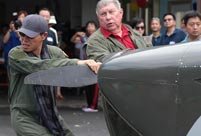 Home-made plane completes test flight in Chicago
Home-made plane completes test flight in Chicago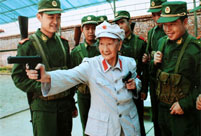 The untold stories of women in the Long March
The untold stories of women in the Long March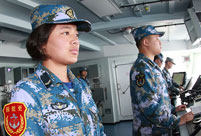 Female soldiers on Frigate Jingzhou
Female soldiers on Frigate Jingzhou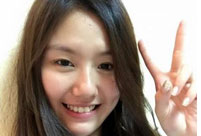 Top 10 most beautiful Chinese athletes in Rio
Top 10 most beautiful Chinese athletes in Rio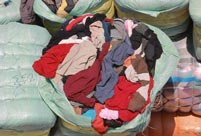 Shenzhen seizes 549 tons of illegally smuggled clothing
Shenzhen seizes 549 tons of illegally smuggled clothing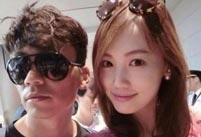 Chinese actor Wang Baoqiang divorces wife, fires manager
Chinese actor Wang Baoqiang divorces wife, fires manager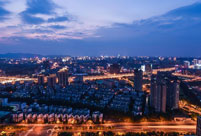 Hangzhou: host city of G20 Summit
Hangzhou: host city of G20 Summit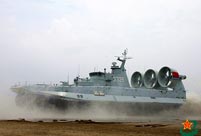 New hovercrafts debut in landing exercise
New hovercrafts debut in landing exercise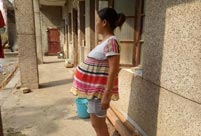 Woman sets Guinness World Record with 17-month-long pregnancy
Woman sets Guinness World Record with 17-month-long pregnancy Top 10 livable Chinese cities
Top 10 livable Chinese cities Top 20 hottest women in the world in 2014
Top 20 hottest women in the world in 2014 Top 10 hardest languages to learn
Top 10 hardest languages to learn China’s Top 10 Unique Bridges, Highways and Roads
China’s Top 10 Unique Bridges, Highways and Roads Getting around the gaokao
Getting around the gaokao  Chinese Net users share the novel ways in which they observe holidays online
Chinese Net users share the novel ways in which they observe holidays online Chinese town, international stage
Chinese town, international stage Machu Picchu: Icon of Peru and the Inca civilization
Machu Picchu: Icon of Peru and the Inca civilization